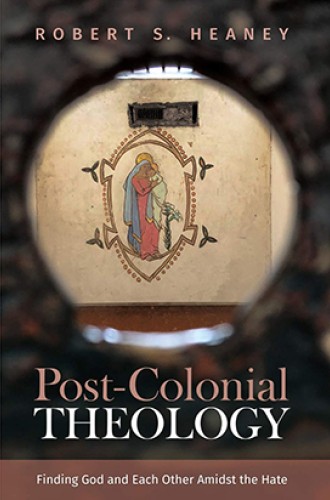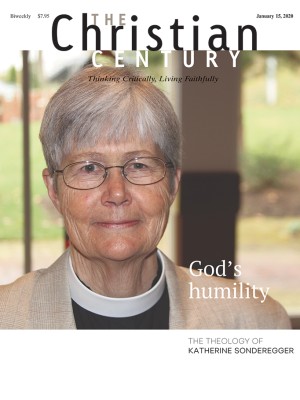How should the church respond to the colonialism that runs through its blood?
Robert Heaney believes the first step is penance.
What Robert Heaney calls coloniality encompasses a multitude of sins. It begins with fear, invariably an unacknowledged fear, rooted in anxiety about identity. Fragile identity is shored up by jobs, neighborhood, prestige, values, tradition, and power. When people appear to jeopardize such things, those people, a minority, are cast as the other. They become subject to stereotyping, scapegoating, and dehumanizing. Any kind of connection or compromise with such people becomes intolerable. Imperialism becomes the better of two grim alternatives; the other is genocide. Thus coloniality and hate are inextricably linked. This much Heaney’s upbringing as a Protestant in Northern Ireland has taught him.
In this book, Heaney broadens his vision to perceive a great swath of wrong, across the world, that bears a significant family resemblance to the pattern of coloniality he has diagnosed in Ireland. The locations are legion; the evils include land theft, rape, murder, enslavement, torture, pollution, depredation of the earth, racism, and genocide.
Read our latest issue or browse back issues.
As grievous as this history is, even more bewildering is the degree of complicity with these evils exhibited by the church and its theologians. Those theologians who attempt to construct postcolonial theology face three challenges: the church has been up to its neck in coloniality; even today among the northern ruling elites of theology there remains widespread skepticism about the methods, quality, and resources of the particular theologies that seek to disrupt its complacency; and among postcolonial theorists at large, theology is not highly regarded as a resource for resistance.
How then to mount a response to the desultory history of the church as a (very) critical friend; how to highlight available theological resources for moving the story past guilt and anger; and how to order an agenda for the church in light of the challenge of postcolonial theology? These are the three questions that shape Heaney’s project.
The answer to the first question lies in attending to the considerable work already done by theologians who have found themselves on the receiving end of coloniality. Heaney listens carefully to the work of Kenyan John Mbiti. While not wholly critical of the missionary movement, Mbiti highlights the way the missionaries justified colonialism, practiced subjugation, disparaged traditional practices, and imported denominational competitiveness. Heaney also draws on the critical awareness exhibited by the 1985 Kairos Document in apartheid South Africa.
Moving on to Korea, he attends closely to the theology of Wonhee Anne Joh, who incorporates gender studies into postcolonial theology and critiques any form of theological engagement with the suffering of coloniality that commends subjugation. She also dismisses any naive assumption that people subject to coloniality are uniquely innocent by recognizing that oppressor and oppressed coexist within the same individual.
And from North America, Heaney outlines the work of Randy Woodley, who vividly portrays the way the Native American story runs counter to the master American narrative of liberty and opportunity. Woodley charts how the missionary movement sought to eradicate native distinctiveness and absorb indigenous peoples into the European moral world, which itself was upheld as absolute truth.
In the book’s sobering middle chapters, Heaney sets out the way coloniality has impacted diverse cultural settings. The cumulative effect is depressing, as resources for resistance and reconstruction seem submerged in wave upon wave of crime and woe. The approach is intentional, as Heaney explains later in the book. But the range of testimony doesn’t add to the sharpness of the critique, and Heaney’s argument lapses a bit in the compounding of complaints, fully justified as those complaints are. He so faithfully quotes other people that his own editorial voice becomes obscured.
As a result, the book only catches fire in the last two chapters, where Heaney addresses the third question that drives his analysis. Here he offers compelling proposals for how the church—in which oppressor and oppressed still coexist—may set about responding to its miserable and disheartening legacy. Inspired by the work of the Canadian theologian Jeremy M. Bergen, Heaney outlines a pattern of contrition, confession, penance, and absolution that resembles the sacrament of reconciliation.
In rich and memorable phrases, Heaney describes what it means to recognize sin and resolve not to sin again. “Ecclesial repentance is not about optics, is not about broadcasting a better message to society, it is not about managing a problem, it is not about progressive politics, it is not even about guilt for a community’s sin. It is about being humbled by the convicting work of the Holy Spirit.” True confession must “ring true to those who suffer coloniality.”
Heaney points out that his book is an exercise in exactly the kind of penance he is commending. He demonstrates a critical awareness of the particularity of dominant cultures and refutes their supposed universality. Then he opens himself to the theological voices of those who resist coloniality. Further, he recognizes that “to speak of the God who became incarnate is to speak of the God who became colonized.” He appreciates that salvation has to mean going beyond coloniality.
In the process Heaney says some powerful words. “Confession is not the means to control the story. It is not putting the pain of the past behind us. It is not closure. It is precisely the opposite.” Confession is the beginning of a new, humbler relationship. It’s not the closure of the book of woe, a woe that in several cases runs many centuries deep.
I finished the book wishing Heaney had concluded with a summary of steps that Christians with coloniality in their blood can and must take to interrupt its ongoing legacy and learn to walk differently, more wisely, and more humbly. In a book of many lists, I found myself wanting one more. But no one reading this book could doubt that the way to salvation begins in profound, heartfelt, and corporate repentance for complicity in and perpetration of terrible wrongs.







